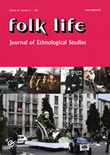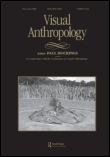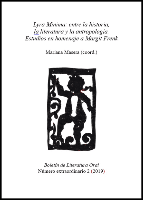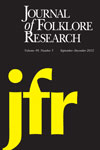
Folk Life-Journal of Ethnological Studies
Scope & Guideline
Exploring the Essence of Culture through Ethnological Insight.
Introduction
Aims and Scopes
- Cultural Heritage and Identity:
The journal emphasizes the importance of cultural heritage, exploring how traditions and practices shape personal and collective identities within specific communities. - Material Culture:
Research often highlights the significance of objects, textiles, and artifacts in understanding the historical and contemporary lives of people, focusing on the interplay between material culture and social practices. - Folklore and Oral Traditions:
The journal publishes studies on folklore, oral histories, and narratives, investigating how these elements contribute to community memory and cultural transmission. - Ethnographic Methodologies:
A consistent focus on ethnographic research methods allows for in-depth analysis of communities and practices, providing rich qualitative insights into folk life. - Interdisciplinary Approaches:
The journal encourages interdisciplinary perspectives, merging anthropology, history, sociology, and cultural studies to provide comprehensive analyses of folk life.
Trending and Emerging
- Material and Visual Culture:
There is an increasing emphasis on the material and visual aspects of culture, as evidenced by studies focusing on textile traditions and the visual representation of heritage. - Intangible Cultural Heritage:
Research exploring intangible cultural heritage, particularly in relation to food and community practices, is gaining momentum, aligning with global trends in cultural preservation. - Identity and Belonging:
Themes surrounding identity, belonging, and community dynamics are increasingly prevalent, reflecting contemporary societal concerns and the impact of globalization on local cultures. - Environmental and Ecological Perspectives:
Emerging studies are beginning to incorporate environmental and ecological perspectives, examining how folk practices interact with and respond to environmental changes. - Digital Ethnography and Technology:
The integration of digital tools and methodologies in ethnographic research is becoming more common, allowing for innovative approaches to studying folk life in the digital age.
Declining or Waning
- Traditional Food Studies:
Although food culture remains a topic of interest, the specific focus on traditional food studies has seen a decrease, as researchers increasingly explore broader themes such as food as intangible cultural heritage. - Historical Architecture:
Research on historical architecture, while still relevant, appears to be less frequent, perhaps overshadowed by more dynamic themes such as material culture and community practices. - Conventional Folklore Studies:
There seems to be a waning interest in conventional folklore studies, as scholars shift their focus towards contemporary practices and the implications of folklore in modern contexts. - Rural vs. Urban Folk Life:
The distinction between rural and urban folk life is becoming less pronounced in recent publications, indicating a potential decline in studies solely focused on rural traditions.
Similar Journals

FOLK MUSIC JOURNAL
Unveiling the Stories Behind the SongsFolk Music Journal, published by the English Folk Dance Song Society, is a prominent publication within the fields of Music and Visual Arts and Performing Arts. This journal, based in the United Kingdom at Cecil Sharp House, has been instrumental in advancing the study and appreciation of folk music, sharing invaluable research and insights from 2002 until its recent coverage concluded in 2020. Notably indexed with a Q3 rank in both the Music and Visual Arts categories for 2023, it stands as a significant resource for researchers, professionals, and students alike, contributing to a deeper understanding of folk music's cultural impact. Although it does not currently offer Open Access, the journal has fostered scholarly discourse, reflecting its vital role in the preservation and analysis of traditional musical forms.

Milli Folklor
Bridging Boundaries in Cultural ResearchMilli Folklor, published by GELENEKSEL YAYINCILIK LTD STL, stands as a significant platform for scholarly discourse in the fields of Arts and Humanities and Cultural Studies, with an ISSN of 1300-3984 and E-ISSN 2146-8087. As a prominent Turkish journal, it has been actively contributing to the academic community since its inception in 2002, and it is set to converge its publishing journey through to 2024. With a commendable Q2 category ranking in both the Arts and Humanities (miscellaneous) and Cultural Studies categories, the journal reflects a solid standing within the academic landscape, sitting in the 40th percentile for general arts and humanities and the 34th percentile in social sciences. Milli Folklor emphasizes the exploration and preservation of folkloric traditions, cultural practices, and societal narratives—facilitating interdisciplinary research that transcends national boundaries. Although primarily a print journal, the insights shared in its pages serve as invaluable resources for researchers, professionals, and students alike who seek to deepen their understanding of cultural phenomena. The journal aims to enrich scholarly discussions while broadening readers' perspectives on the intricate tapestry of culture and society.

Visual Anthropology
Unveiling Human Behavior Through the Lens of VisualsVisual Anthropology is a distinguished journal published by Routledge Journals, Taylor & Francis Ltd in the United Kingdom. With an ISSN of 0894-9468 and E-ISSN 1545-5920, this journal focuses on the intersection of visual media and anthropological research, exploring the ways in which visual representations influence cultural practices and perceptions. Since its inception in 1987, Visual Anthropology has contributed significantly to the fields of Anthropology and Cultural Studies, earning a Q2 rank in both categories as of 2023. With a solid impact factor and strategic indexing, the journal maintains a vital place for scholars seeking to understand the visual dimensions of human behavior and societal structures. Although it operates under a traditional subscription model, its rigorous peer-review process ensures the dissemination of high-quality research. The journal invites researchers, professionals, and students alike to engage with cutting-edge studies that bridge visual culture and anthropological inquiry.

Boletin de Literatura Oral
Advancing Interdisciplinary Dialogue in HumanitiesBoletin de Literatura Oral is an esteemed academic journal published by UNIV JAEN, SERV PUBLICACIONES, dedicated to advancing the fields of Anthropology, History, Linguistics, and Literary Theory. With its Open Access model established in 2011, the journal ensures that valuable research reaches a global audience without financial barriers. Based in Spain, at the CAMPUS LAGUNILLAS in Jaen, this publication has been recognized for its rigorous scholarship, achieving a Q4 ranking in Anthropology and notable Q3 and Q2 rankings in related disciplines as of 2023. The journal thrives on its commitment to fostering interdisciplinary dialogue, serving as a vital resource for researchers, professionals, and students keen on exploring the rich tapestry of oral literature and its implications across cultures. The journal is indexed in major databases, underscoring its relevance and accessibility in the research community.

JOURNAL OF FOLKLORE RESEARCH
Advancing Knowledge in Folklore and Cultural StudiesJOURNAL OF FOLKLORE RESEARCH, published by Indiana University Press, serves as a vital platform for scholarly exploration within the realms of folklore, cultural studies, and music. With an ISSN of 0737-7037 and an E-ISSN of 1543-0413, this journal has converged its content from 2002 to 2024, facilitating a dynamic discourse on the interplay of traditional narratives and contemporary cultural forms. Despite its current tier in the Q4 category for both Cultural Studies and Music, the journal is increasingly recognized for its contributions, ranking 69th in Music and 526th in Cultural Studies as per the latest Scopus metrics. Researchers, professionals, and students alike will find this journal an essential resource, rich with insights that traverse the complexities of human expression and societal narratives. Although not an open-access journal, the valuable research contained within its pages is crucial for advancing knowledge in folklore scholarship and its related disciplines.

Etnoloska Tribina
Championing Ethnological Research Since 1970Etnoloska Tribina, published by the Croatian Ethnological Society, is a premier open-access journal dedicated to the fields of Anthropology and Cultural Studies, serving as a vital platform for scholars and practitioners since its inception in 1970. With an impressive impact factor reflected in its current Q3 rankings in both Anthropology and Cultural Studies, the journal continues to foster scholarly discourse and innovative research within these disciplines. As part of the Scopus database, Etnoloska Tribina ranks in the top 67th percentile for Cultural Studies, providing readers with cutting-edge explorations and critical analyses that contribute to the understanding of cultural phenomena. The journal's commitment to open access empowers a global audience in Croatia and beyond, facilitating the exchange of ideas and knowledge across borders. Researchers, professionals, and students alike can benefit from the rich and diverse array of articles that illuminate cultural identities and anthropological inquiry from 2011 to the present.

VOLKSKUNDE
Exploring the Depths of Cultural HeritageVOLKSKUNDE is a distinguished academic journal dedicated to the study of folklore and cultural traditions, published by CENTRUM STUDIE DOCUMENTATIE based in Belgium. With an ISSN of 0042-8523, this journal serves as an essential platform for researchers, scholars, and students interested in the rich tapestry of cultural heritage and ethnographic research. Although currently not available as an open-access publication, VOLKSKUNDE is committed to disseminating high-quality scholarly articles that provide critical insights into the complexities of cultural practices across diverse societies. The journal’s objective is to foster academic discourse and stimulate inquiry into folklore studies, promoting a deeper understanding of cultural dynamics. By engaging with a broad range of topics within its scope, VOLKSKUNDE is an invaluable resource for anyone looking to deepen their knowledge in the field of folkloristics.

Ezhegodnik Finno-Ugorskikh Issledovanii-Yearbook of Finno-Ugric Studies
Connecting Scholars to the Finno-Ugric NarrativeEzhegodnik Finno-Ugorskikh Issledovanii-Yearbook of Finno-Ugric Studies is a distinguished academic journal published by Udmurt State University, focusing on the vibrant field of Finno-Ugric studies. With its ISSN 2224-9443 and E-ISSN 2311-0333, this journal serves as a vital platform for researchers, scholars, and students to contribute and access high-quality, peer-reviewed work that explores the linguistic, cultural, and historical dimensions of Finno-Ugric peoples. This journal is particularly essential for those interested in interdisciplinary studies, as it often intersects with anthropology, linguistics, and cultural studies. Although currently not available as open access, it provides valuable insights for advancing academic discourse in this underrepresented area of study. The Yearbook is located in Izhevsk, Russia, and is committed to enriching the academic community, fostering collaboration, and promoting understanding of the Finno-Ugric heritage.

Revista de Etnografie si Folclor-Journal of Ethnography and Folklore
Connecting Cultures, Celebrating TraditionsRevista de Etnografie si Folclor-Journal of Ethnography and Folklore, an esteemed publication by EDITURA ACAD ROMANE, serves as a vital platform for the dissemination of research and scholarship in the fields of anthropology and cultural studies. Established in Romania, this journal has committed itself to exploring the rich tapestry of ethnographic practices and folklore traditions, favoring interdisciplinary approaches that illuminate the diverse cultural heritage of societies. With an ISSN of 0034-8198, the journal has been instrumental in fostering academic dialogue and engaging researchers, professionals, and students alike. Though currently classified in the Q4 category of both anthropology and cultural studies, its continued growth from 2014 to 2024 signals an evolving contribution to understanding cultural dynamics. Accessible via traditional publication means, the journal encourages contributions that deepen the understanding of ethnographic methodologies and cultural narratives, thereby enriching the academic landscape.

CULTURE & PSYCHOLOGY
Exploring the Intersections of Mind and CultureCULTURE & PSYCHOLOGY is a premier journal published by SAGE PUBLICATIONS LTD, dedicated to advancing the understanding of psychological processes within cultural contexts. With an ISSN of 1354-067X, this influential journal has been a cornerstone in the fields of Anthropology, Cultural Studies, Social Psychology, and Sociology since its inception in 1995. Notably, it holds prestigious Q1 rankings in both Anthropology and Cultural Studies, reflecting its high impact and substantial contribution to these disciplines. With a strong emphasis on interdisciplinary research, it invites rigorous empirical studies, theoretical discussions, and cross-cultural analyses that illuminate the interplay between culture and psychological phenomena. Readers can explore valuable insights without open access barriers, benefiting from a wealth of knowledge attested by its 2023 Scopus percentile rankings, ranging from the 40th to the 89th percentile in its respective categories. As such, CULTURE & PSYCHOLOGY remains an essential resource for researchers, professionals, and students eager to deepen their understanding in this dynamic and evolving field.